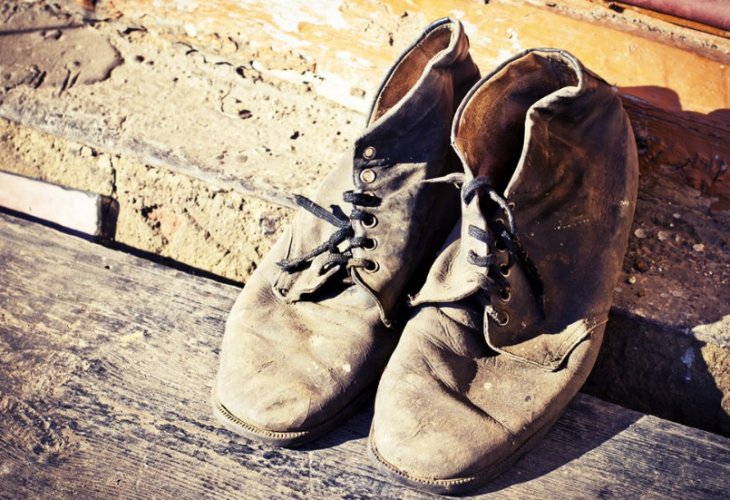Personal Stories
The Pair of Shoes That Traveled from Auschwitz to Heaven
A Holocaust story of selflessness, true giving, and the power of one mitzvah done from the heart
 (Photo: shutterstock)
(Photo: shutterstock)"I heard this story from someone who personally knew the people involved,” begins Rabbi Shabtai Slavaticki in his weekly column in the Karov Elecha newsletter.
During the Holocaust, when Jews were sent to the camps, everything was taken from them, their clothes, their shoes. In their place, they were given rags to wear.
This story happened in one of those camps. Every day, the Jewish prisoners were forced to rise early and march outside to chop wood. It was winter, and snow fell heavily. One Jew’s shoelace tore along the way. A cruel Nazi guard noticed and shouted at him: “Why are your shoes untied? Tie them now!”
The Jew bent down and tried, but the lace was too frayed. The guard commanded: “If you can’t tie your shoe, take it off. We must have order.” The man removed his shoe. A few moments later, the guard came back. “One shoe on and one off? That’s disorder. Take off the other one too.”
Now barefoot, the Jew was forced to walk through the snow. His feet quickly froze, stuck to the icy ground. The snow cut and burned his skin, and soon his feet were bleeding. His friends’ hearts broke watching him suffer, but they were powerless. When the day’s labor ended, they returned to the barracks, and the injured Jew collapsed in agony.
In that same barracks was another Jew who, before the war, had asked a dentist to hide a diamond in his tooth in case of trouble. Upon arriving at the camp, he had old, torn shoes and suffered terribly from the cold. Eventually, he made the painful decision to remove the diamond from his tooth using a piece of wood and used it to bribe a Nazi guard for a proper pair of shoes.
Not long after, the guard returned, not with ordinary shoes, but a warm pair of fur-lined boots.
Then this Jew saw his friend, barefoot and bleeding. He got up and planned to give him his old shoes. But at that moment, something deeper stirred inside him. A spark of divine light, the soul of a Jew shone through. Instead of handing over the old shoes, he offered his brand-new fur boots.
The friend tried to refuse. But he insisted. Finally, the wounded man accepted.
The Jew who gave up the boots survived the war. He eventually made his way to the United States and became a successful businessman.
One day, a package arrived from Israel. Inside were those very same fur boots. As soon as he saw them, he broke down in tears. Clearly, his friend had found him. And indeed, a few days later, the phone rang.
“Someone told me you’re alive,” his friend said, full of emotion. “Can we meet?”
“Of course!” he replied with joy.
They met not long after. It’s easy to imagine how moving their reunion was. At the end of their meeting, the businessman handed the boots back to his old friend. “These are yours,” he said. “Keep them. I’ll hold on to the torn shoes.”
In his living room stood a beautiful display cabinet filled with silver items. But in the very center, in the most honored place, sat a dusty, worn pair of old shoes.
Years later, when this righteous man passed away, his will included a special request: to be buried with those shoes. “When I go up to Heaven,” he had written, “I want these to go with me.”
Rabbi Slavaticki ends the story with a question: Why? After all, this man had done many mitzvot in his life. He gave tzedakah (charity), prayed, helped others. So why did this one act mean so much?
Because in that moment, he felt he had truly gone beyond himself. He gave up not just something for someone else, he gave up his comfort, his survival, his warmth. That kind of mitzvah, done with true self-sacrifice, touches eternity.
“This,” Rabbi Slavaticki explains, “is the message of brit milah (the covenant of circumcision). It’s not just about one action but it’s about a lifelong commitment to peeling back the outer shell, to living with Jewish purpose, every day.”
He adds: “Every day, we should think about doing just one mitzvah that takes us out of ourselves. One act that reflects who we really are inside.”
“When does a person feel real joy? When he gives in to a habit, or when he overcomes it? When do people admire someone when he says, ‘I smoke,’ or when he says, ‘I quit’?”
That inner strength, the ability to rise above the ego reveals who we really are. That’s why we don’t just do a mitzvah once. Judaism is about constant connection. The covenant isn’t a one-time event. It’s something we live, every day, every moment.
And sometimes, one mitzvah like giving up your boots can echo all the way to Heaven.

